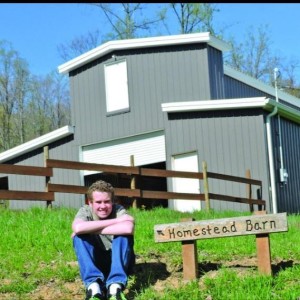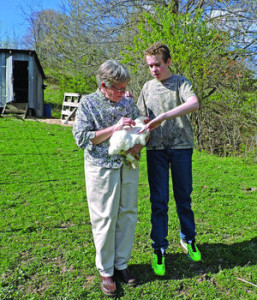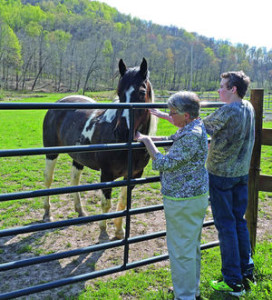Homestead Farm Center….creating a future for individuals with autism.
- 05, 19, 2015
- Category Uncategorized
- Posted By Julie Sole
- No Comments.


 Parents always worry about their child’s future. They hope they will grow up to be successful and, more importantly, happy. Parents also worry about what will happen to their children once they are gone. And for Ann Burns and her husband Dan, this was something they thought about with their son Isaiah, who has autism.
Parents always worry about their child’s future. They hope they will grow up to be successful and, more importantly, happy. Parents also worry about what will happen to their children once they are gone. And for Ann Burns and her husband Dan, this was something they thought about with their son Isaiah, who has autism.
Autism is a result of a neurological disorder that has an effect on a person’s communication and social interaction skills.
Isaiah is in eighth grade and is just like any other kid — he doesn’t particularly like to do his chores. “When you say, ‘OK, we have to go and do some work,’ he would rather sit and play on the iPad or the computer or watch TV,” she laughed. “But when he’s outside working, I think he has a sense of accomplishment afterward.”
The Burns family lives on Burn Farm, which has been in Dan’s family since his grandfather bought the first section in 1946.
Isaiah works hard to collect eggs from squawking chickens, feed their energetic goats and help his dad mend the fence when needed. Ann Burns said the chores they give him have helped develop his skills.
A few years ago the couple thought about Isaiah’s future and what he would do after high school.“There are opportunities in West Virginia for adults with autism, but they are limited. There are not a whole lot of choices out there,” Burns said.
“In the future we have so many individuals that are going to need some kind of opportunity. We don’t have enough facilities for the numbers that are coming up.”
The couple talked about how great it would be to create a place for young people with autism and other developmental disabilities to come and work on a farm, learning and developing those skills they could use in the workforce.
That idea stayed in the back of their minds for a couple years.
Then a 100-acre piece of property adjacent to their family farm was available to purchase. They decided to buy the land and develop a nonprofit organization called the Homestead Farm Center. This quiet, peaceful section of land will be transformed to provide training and jobs for adults with disabilities after they leave the high school program. Their vision is to create a quality rural living environment that enables individuals to work, learn, live and thrive.
Burns said they formed the nonprofit corporation in August 2014, and shortly afterward she started looking for a board of directors. Everyone who heard about the couple’s plan loved the idea and wanted to work to make that vision a reality.
Julie Sole, the executive director of the Disability Action Center, said she was thrilled when she heard Burns’ plan. Together, by combining their resources, they will be able to serve more individuals in the community.
“I felt like she had really one of the best ideas I have heard in a really long time, as far as permanent services and transition services for folks with autism and other disabilities,” she said.
“It’s really one of the most innovative, exciting things that we’ve had happen in North Central West Virginia … In the state I don’t feel like anyone has the vision and the long-term sustainability as the Homestead Farm Center Project will bring. “It’s going to combine disability services with residential treatment with workforce development. That in and of itself is very promising for sustainability and longevity.”
Sole said transitioning from high school to adulthood is a stressful time for every family, especially for a student with a disability. These individuals, she explained, may have been in the same classroom with the same special education aides for years and years. They take comfort in routine and it is a shock to them when it changes significantly.
The board members determined that it would be beneficial for everyone if they opened the Homestead Farm Center to those with developmental disabilities, not just autism. Burns said the variety of levels would support and complement each other and they would be able to grow.
“Every individual with disabilities is different. That’s the only thing they have in common actually. They are all so different and unique,” she said.
Burns said the Homestead Farm Center is not an original idea, though. There are dozens of these types of facilities across the United States, but she believes it’s the first program of its kind in the state.
“Everyone is having the same idea — how wonderful to have these people with disabilities and let them work on a farm and in a garden and in a greenhouse. These are jobs that they can do. That they would enjoy doing, have a good quality of life and be a productive member of the community, too,” Burns said.
There are many possibilities for programs when the Homestead Farm Center opens in the future. Many of these programs will teach individuals with developmental disabilities to care for animals like chickens, turkeys, dairy goats, sheep and horses. It will also teach them how to create products like goat’s milk, weave with wool and market fresh eggs.
Individuals could also learn how to operate in a greenhouse and be involved in vegetable production. Programs can teach them how to grow and raise various herbs and fruits like strawberries, blueberries and blackberries.
Burns said the future is unlimited. They would like to see this farm be successful enough that it would expand throughout the state — maybe one in each county.
But for now, their ultimate goal is to grow and provide a residential component so they wouldn’t just offer day programs. Burns said they don’t want to build big dormitories or destroy the character of the place as a farm, but they do hope to build a few houses on the property.
She said they want to maintain a family atmosphere with host families living on the property, which has been a successful model in other parts of the United States.
“We don’t want it to be isolated, but we want it to be private, too,” Burns said. “We want them to have their privacy in their homes and to have it be a quiet, peaceful place. It is that now — it’s extremely peaceful here. It’s extremely quiet.
“And that’s one thing I think is good for everybody, but it really provides a nice environment for someone with disabilities especially if they’re sensitive to a lot of commotion, a lot of noise and a lot of disruption.”
Burns said she hopes the Homestead Farm Center will interest individuals to come and volunteer.
For more information about the Homestead Farm Center, visit http://homesteadfarmcenter.com.
Our Programs
- Activities Calendar
- Career Readiness
- Education and Training
- Health & Wellness Program
- Social Development
- Exercise and Fitness
- GO! Get Outdoors
- Experience It Co-Op
- RURAL (Rural to URban Agricultural Learning) Program
- Advocacy
- Mission Transition
- The Assist Award
- DAC Camp CAN-DO
- Special Olympics WV Marion County
- DAC Education and Resource Fund

